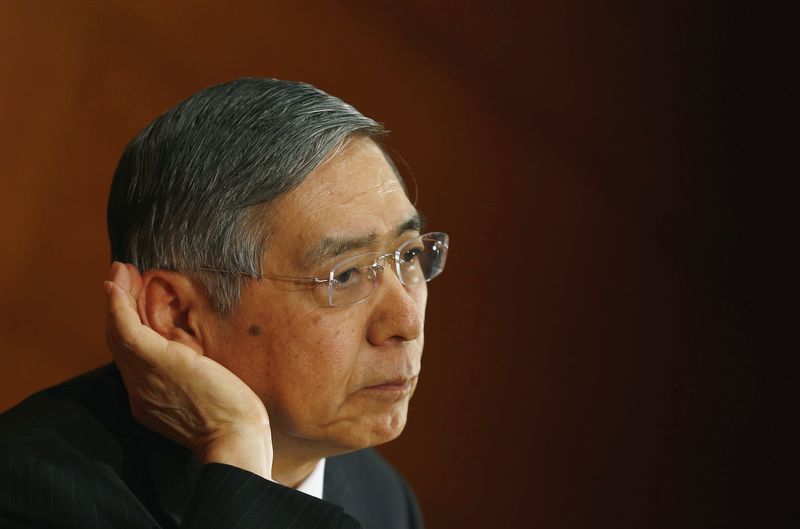By Tetsushi Kajimoto
TOKYO (Reuters) - Japan Inc sees no need for an aggressive pursuit of a 2 percent inflation goal or additional monetary easing, a Reuters poll showed - a stance that supports the central bank's recent softer tone on achieving its consumer price target in the near future.
Analysts, however, expect the Bank of Japan to embark on more stimulus later this year, topping up its latest round launched in October, to support economic growth and ensure rises in inflation, a separate Reuters poll showed this month.
Seeking to wrench the country out of nearly two decades of deflation, BOJ Governor Haruhiko Kuroda unleashed an unprecedented burst of monetary stimulus in April 2013, saying the aim was to achieve 2 percent inflation in roughly two years. But last month he declared the timeframe was not set in stone and noted that a steep slide in oil prices had derailed earlier expectations.
The Reuters Corporate Survey, conducted Feb. 2-17, showed that while most firms want consumer inflation to be higher than the current 0.5 percent, four-fifths were content with levels of less than 2 percent.
Just over 70 percent of companies said they saw no need for additional easing despite the plunge in oil prices - a figure consistent with previous survey results in recent months.
Bold monetary stimulus over the past two years has weakened the yen substantially and many respondents said any further softening would drive up import costs.
"Japanese firms appear to believe more monetary stimulus would do more harm than good as it could raise volatility in markets, disrupting their business," said Takuji Okubo, chief economist at Japan Macro Advisors, who reviewed the poll results.
"It's true that Japanese exporters are benefiting from a weak yen caused by monetary easing, but many companies seem to be content with current exchange rate levels."
MONETARY POLICY MAXED OUT?
The survey of 483 large and mid-sized firms showed 38 percent would like to see inflation between 1 percent and 2 percent. Another 28 percent preferred inflation around 1 percent while 13 percent wanted lower levels.
Around 260 firms answered questions on inflation. Respondents reply anonymously to the survey which is conducted for Reuters by Nikkei Research.
In addition to fears of further yen weakness, corporate managers in the poll also wrote that a 2 percent inflation goal was unrealistic and unnecessary, and that monetary policy had done all that it could do.
"The Bank of Japan's monetary policy up until now has already had an impact and we are gradually moving towards a virtuous cycle for capital spending from manufacturers," wrote a respondent at an electronics firm.
"That prices aren't going up is not the fault of monetary policy but rather that companies which are getting fat on profits in the wake of changes in monetary policy have lagged in passing on those rewards in the form of wages," the manager added.
Last week, the BOJ stood pat on policy. Unfazed by slowing inflation and tumbling oil prices, Kuroda said he saw no need now for stimulus but added he would not hesitate to ease again if circumstances warranted.
The 60 percent slide in oil prices between June and January has also boosted hopes that Japanese companies will reap some windfall profits as their hefty fuel import costs drop.
But the survey found that just over two-thirds of companies saw no net gain, with any benefits from oil price drops nullified by climbs in import costs due to weakness in the yen.

Around 49 percent of firms saw domestic demand flat this year while 44 percent saw it expanding a little, the survey also showed.